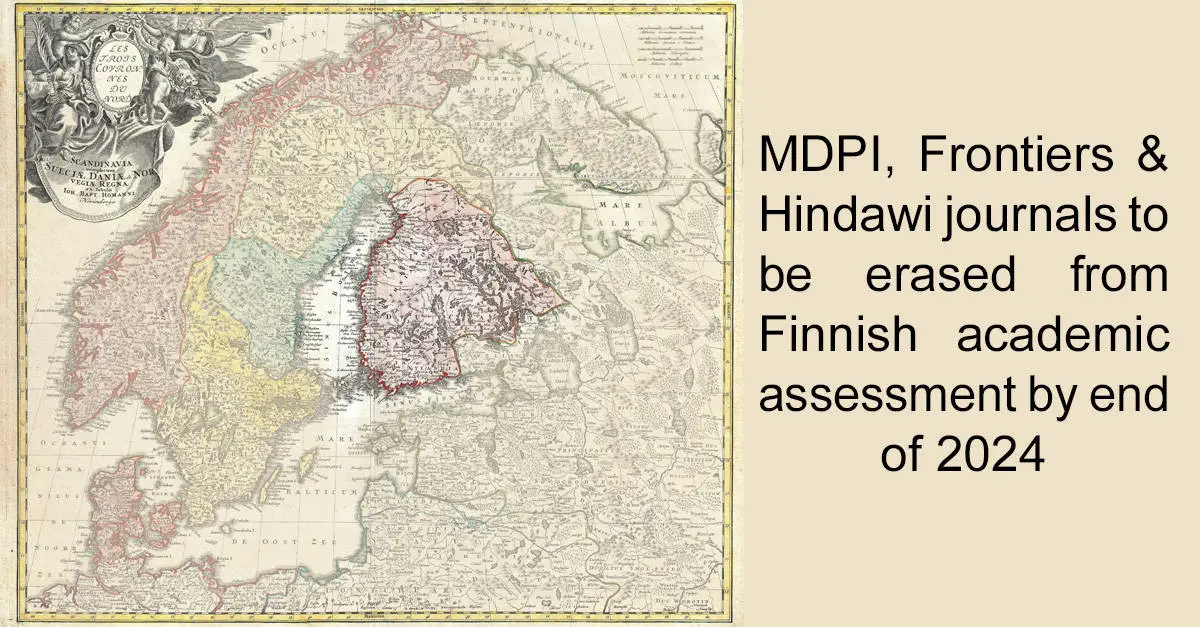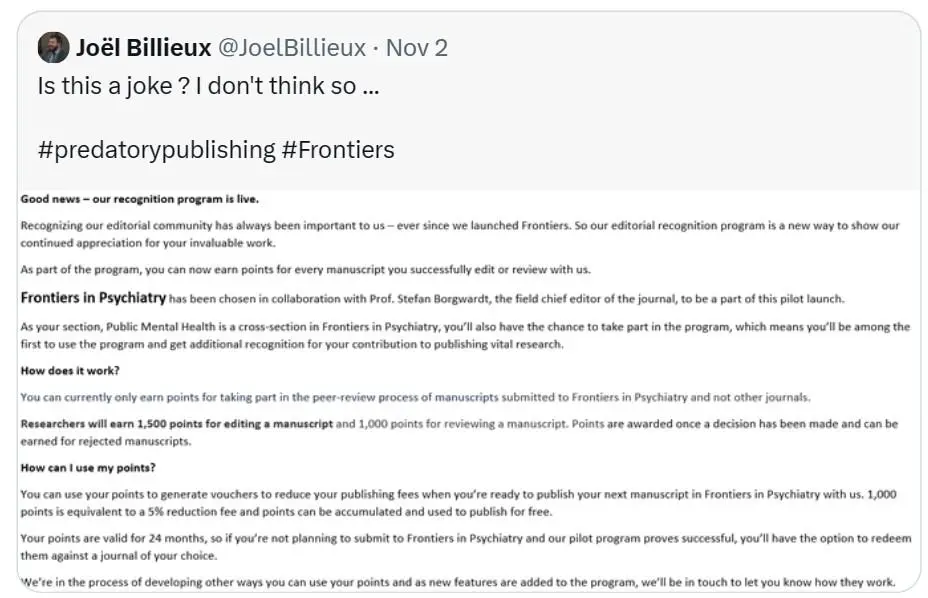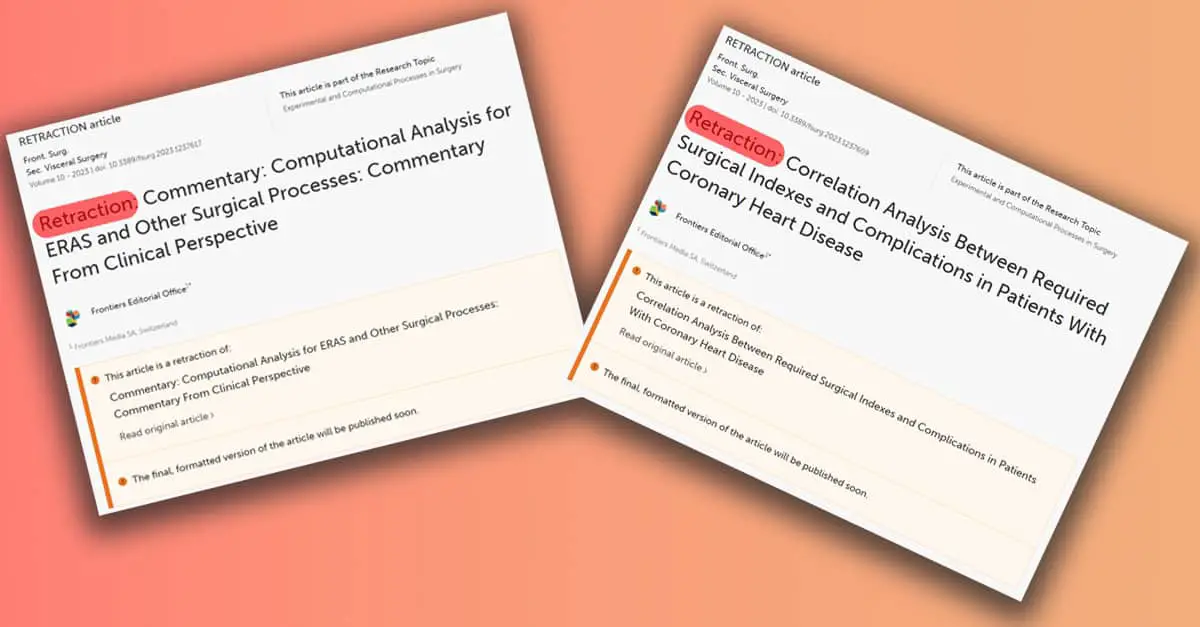In a tweet, Veli-Matti Karhulahti said:
“Not confirmed yet but all MDPI, Frontiers & Hindawi journals planned to be erased (level 0) from Finnish academic assessment by end of 2024. Should be clear that if you’re a researcher here, a high time to stop submitting/reviewing for those journals.“
Here some things that sprung to mind when we read this.
1) It would be useful when (and if) this comes to pass that the reasons why are given. Most people will assume that it is because they are being classified as predatory journals but is that the reason? It could be that the decision makers feel that:
⭕️The APCs are too high.
⭕️There are too many special issues.
⭕️Are they considered predatory journals?
⭕️The journals are not considered predatory, but they do not feel that the journals procedures are robust enough?
⭕️Are the journals being exploited by paper mills and the Finland authorities are worried about the reputation of those journals.
You might be aware that Wiley recently acknowledged an issue with Hindawi journals (which it had bought) as they were being targeted by paper mills. We tweeted on this. You can see the Wiley statement here.
⭕️They could have carried out some detailed analysis on acceptance rates (for example) and decided that it does not meet what they would expect from publishers they are funding.
⭕️They may just been err’ing on the side of caution and have doubts about these publishers and are taking the view that “the world ain’t short of scientific journals, so why not just exclude them”.
⭕️ They may feel that the publishers are more focused on the financial returns, rather than maintaining the quality and integrity of the scientific archive.
Whatever the reason, it would be useful to know.
2) Does Finland already have a restricted list and are these publishers being added to that list, or is this a “new” list?
The obvious publisher that may be on an existing list is OMICS. Are they? Does anybody know?
3) In some of the comments we received to our tweet on this topic, some suggested that there may be a case to just restrict specific journals, rather than restricting the entire publisher’s portfolio.
Is that sensible? We add the following comments by way of context to this question.
⭕️ It could be argued that a publisher has responsibility for all the journals it publishes and, even one bad journal, is a reflection across the entire portfolio.
⭕️ It could equally be argued that the quality, processes and robustness of a journal is down to the Editor-in-Chief and if a journal is well run, should it be treated in the same way than a less well run journal from the same stable.
⭕️ If you look at the reports of the way some publishers manage their journals, there is a view that the editors (EiCs and Associate Editors) have less control than you might expect and the publishers are managing a lot of the key processes and making a lot of the key decisions.
⭕️ What, if any role, does the fact that specific journals are indexed by COPE, DOAJ, OASPA, Scopus and Clarivate have on any decision making process? Does it mean anything if a journal (or even a publisher) is reognised by bodies such as those listed? Does that feed into the decision making process?
4) We wonder whether the publisher’s themselves have been included in any discussions that have (are) taking place or whether this discussion is taking place without them?
5) It was reported a month or so ago (not sure of the exact timing) that Malaysia had banned the use of public research funds being used to pay APC’s for these three publishers (note, this is different to banning them entirely in that country).
Other universities (in China we believe) have banned submitting to these publishers.
Does anybody have a complete list of where these publishers have been banned, restricted, named as unsuitable (however you want to phrase it)?
6) Will these restrictions, should they come about, be of concern to the three publishers mentioned?
7) The report says that these publishers may be restricted by the end of 2024. Why does it take so long to make a decision?
Final comments
- This is an interesting story and one we will watch with interest.
- This article was originally posted as a tweet. You can see that tweet here.
- If you want to see what we have been saying about MDPI, take a look at out Twitter (X) feed on this topic.
- If you want to see the publishers web sites, they are available here: MDPI, Frontiers and Hindawi.




